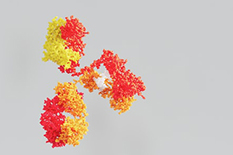Antibodies are indispensable research tools in Biosciences and Medicine, as they enable to identify and target specific molecules. Many commercial antibodies are unfortunately not reliable as they do not actually recognize the molecules they are advertised to target. Although marketed as specific, it is almost always left to the scientists to validate the antibodies they buy and use.
A team led by IPEK scientists Johan Duchêne , also member of the LMU Open Science Center, and Antal Rot has now investigated commercial antibodies against the molecule ACKR1, which is expressed on red blood cells, endothelial cells, and specific neurons. On endothelial cells, it is an important regulator of inflammation, as it controls the migration of white blood cells into tissue. It had been shown that the malaria pathogen uses ACKR1 to infect red blood cells. A study from 2016 reported furthermore that ACKR1 is also expressed on monocytes and macrophages. If held true, it could challenge how we currently apprehend the pathophysiological functions of ACKR1 and could even raise the question, as to whether the malaria parasite could also infect macrophages and monocytes.
The team has now refuted this study by demonstrating that the antibodies do not recognize the molecule and ACKR1 is not expressed by macrophages and monocytes. Reproducibility and replicability of research results are important quality criteria in science. As the authors emphasize, their study exemplifies the importance for the scientific community of publishing corrections. The authors hope that their voice, among others, will help scientists 'get it right'.

